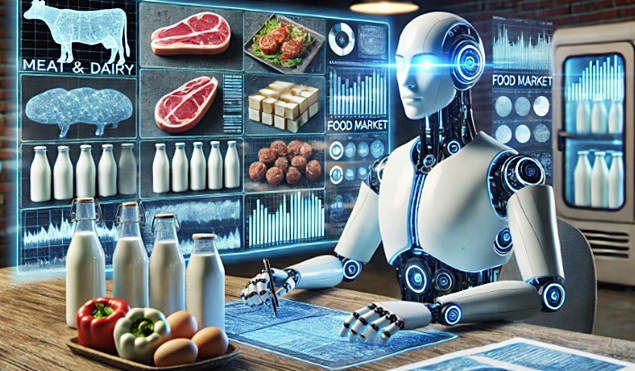1433

Artificial Intelligence: A Catalyst for Transformation in the Global Food Market
Artificial intelligence (AI) has become a key tool in transforming the food market, offering innovative solutions for demand forecasting, supply chain optimization, and food waste reduction. Both in Europe and the United States, companies and organizations are increasingly adopting AI-based technologies to enhance the efficiency and sustainability of the food industry, The Guardian reports.
Demand Forecasting and Inventory Management
One of the most significant applications of AI in the food sector is demand forecasting. Advanced algorithms analyze historical data, consumption trends, and external factors such as weather conditions or seasonal events to anticipate future demand for food products.
These predictions allow retailers and producers to adjust their production and inventory levels, minimizing losses and reducing costs associated with overproduction or stockouts.
For example, UK-based online grocery retailer Ocado has implemented AI to improve operational efficiency. This has led to cost reductions and streamlined processes, allowing the company to adjust workforce strategies and enhance its financial performance.
Supply Chain Optimization
AI also plays a crucial role in optimizing food supply chains. By analyzing real-time data, AI-powered systems can identify inefficiencies, anticipate delays, and propose alternative delivery routes.
This level of visibility and adaptability is vital to ensure that perishable goods reach their destinations in optimal condition, thereby reducing waste and ensuring customer satisfaction.
In the United States, a partnership between Ocado and grocery giant Kroger aims to implement AI-driven automated distribution centers to streamline delivery processes and better meet market demands. Although implementation has been slower than initially anticipated, both companies remain optimistic about the long-term benefits of this technology.
Reducing Food Waste
Food waste is a global issue with significant economic and environmental implications. AI provides effective tools to address this challenge by monitoring and analyzing data throughout the supply chain.
For instance, by using sensors and machine learning algorithms, companies can detect and prevent spoilage during transportation and storage.
In addition, AI can help retailers manage their inventories more efficiently, reducing the amount of unsold products that end up being discarded. Through accurate demand forecasts and real-time data-based dynamic pricing adjustments, waste can be minimized while revenues are maximized.
Precision Agriculture and Productivity Gains
In agriculture, AI is used to improve productivity and sustainability. Precision farming technologies — including drones, sensors, and data analytics algorithms — enable farmers to monitor crop health, optimize resource use, and prevent disease or pest outbreaks.
In Kenya, for example, farmers have started using AI-based tools such as "Virtual Agronomist" and "PlantVillage" to boost crop productivity and manage resources efficiently. These technologies provide personalized recommendations on fertilization and pest identification, helping to increase yields and support food security.
Regulation and Ethics in AI Use
As the use of AI in the food industry expands, so do concerns about ethics, privacy, and labor impact. In 2022, the European Parliament adopted a resolution on artificial intelligence in the digital age, highlighting the importance of a human-centered approach and strong protection of fundamental rights.
Furthermore, the European Commission has developed a regulatory framework to promote the adoption of trustworthy AI, ensuring that technologies used in the food sector — and beyond — adhere to ethical standards and deliver real benefits to society.





